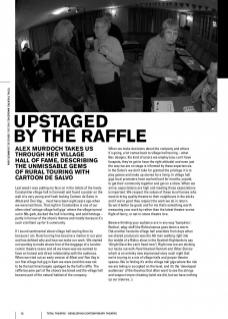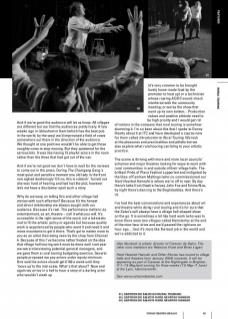Last week I was putting my face on in the toilets of the lovely Constantine village hall in Cornwall and found a poster on the wall of a very young and fresh looking Cartoon de Salvo in Meat and Two Veg… must have been eight years ago when we were last there. That night in Constantine is one of our often cited ’vintage village hall gigs´ where the village turned out in 50s garb, decked the hall in bunting, and sold hotdogs – partly in honour of the show’s themes and mostly because it´s such a brilliant up-for-it community.
If I sound sentimental about village hall touring then its because I am. Rural touring has become a marker in our year and has defined why and how we make our work. We started out wanting to make shows free of the baggage of a Londoncentric theatre scene and all we knew was we wanted to have an honest and direct relationship with the audience. When we tried out an early version of Meat and Two Veg in our first village hall gig in Kent we were (and this was not to be the last time) largely upstaged by the hall’s raffle. The raffle became part of the show’s tea break and the village hall became part of the natural habitat of the company.
When we make decisions about the company and where it´s going, a lot comes back to village hall touring – what Bec designs, the kind of actors we employ (you can’t have fusspots, they’ve got to have the right attitude) and even just the way we are on stage is informed by these experiences. In the Salvo’s we don’t take for granted the privilege it is to play games and make up stories for a living. In village hall gigs local promoters have worked hard for months, unpaid, to get their community together and get on a show. When we arrive, expectations are high and meeting those expectations is important. We respect the values of these local heroes who want to bring quality theatre to their neighbours in the sticks and if we’re good they respect the work we do in return. So we’d better be good; and for me that’s something worth measuring your work by rather than the latest theatre-scene flight of fancy, or set-in-stone theatre lore.
Beware thinking your audience are in any way ‘bumpkins´. Radical, edgy stuff like Ridiculusmus goes down a storm. (Yet another favourite village hall anecdote from days when we shared producers was the AA man walking right into the middle of a Ridics show in the Scottish Highlands to say ‘Alright Dave the van’s fixed now’). Right now we are sticking our necks out with Hard Hearted Hannah and Other Stories which is an entirely new improvised story each night that we’re touring to a mix of village halls and proper theatre spaces. We´re finding it’s at the village hall gigs where the risk we are taking is accepted on the level, and it’s the ‘developed audiences’ of the theatres that often want to see the strings and suspect impro cheating (wish we did, but we have nothing up our sleeves...).
And if we’re good the audience will let us know. All villages are different but we find the audiences pretty lively. A few weeks ago in Icklesham in Kent (which has the best pub in the world, by the way) we’d improvised a field of cows somewhere out there in the direction of the audience. We thought at one point we wouldn’t be able to get those naughty cows to stop mooing. But they quietened for the serious bits. It was like having 73 playful actors in the room rather than the three that had got out of the van.
And if we’re not good we don´t have to wait for the reviews to come out in the press. During The Chaingang Gang´s most quiet and sensitive moment one old lady in the front row sighed deafeningly ‘Oh no, this is rubbish’. Turned out she was hard of hearing and had lost the plot; however let’s not have a disclaimer spoil such a story.
Why do we keep on telling this and other village hall stories with such affection? Because it’s the honest and direct relationship we always sought with our audience. Because it’s real. The performance matters: as entertainment, as art, theatre – call it what you will. It’s accessible in the right sense of the word, not a tokenistic nod to fit the artistic policy or agenda but because quality work is experienced by people who want it and need it and move mountains to get it there. That’s got to matter more to you as an artist than being seen by the chap from Channel 4. Because of this I´ve become rather fixated on the idea that village hall touring work must be done well. Last year we were interviewing potential general managers, and we gave them a rural touring budgeting exercise. Several people proposed we pay actors under equity minimum. One said the actors should get £150 a week until they ‘move up´to the mid-scale. What´s that about? Now and again we arrive in a hall to hear a story of a darling actor who wouldn’t wash up (it’s very common to be brought lovely home-made food by the promoter to heat up) or a technician whose roaring AC/DC sound-check interfered with the community meeting; or worse the show that went up its own bottom... Production values and positive attitude need to be high priority and I would get rid of notions in the company that rural touring is somehow slumming it. I´m so keen about this that I spoke to Danny Hearty about it at ITC and have developed a course now for them called Introduction to Rural Touring. We look at the pleasures and practicalities and pitfalls but we also explore what rural touring can bring to your artistic practice.
The scene is thriving with more and more local councils’ schemes and major theatres looking for ways to work with rural communities in and outside of their village halls. The brilliant Pride of Place Festival supported and instigated by the likes of Farnham Maltings (who co-commisssioned our Hard Hearted Hannah) is where we’re off to next. By day there’s talks from theatre heroes John Fox and Emma Rice, by night there’s dancing to the Baghdaddies. And there’s us.
I’ve had the best conversations and experiences about art and theatre while doing rural touring and it’s for sure that the Salvo’s will always have a village hall-shaped show on the go. It is sometimes a bit like hard work (who was to know there were two villages called Hamsterley at the end of the nine-hour drive and we’d passed the right one an hour ago…) but it’s more like the best job in the world and we’re addicted to it.
Alex Murdoch is artistic director of Cartoon de Salvo. The other core members are Rebecca Hurst and Brian Logan.
Hard Hearted Hannah and Other Stories has toured to village halls and theatres from January 2008 onwards. It will be appearing as part of Caravan at the Nightingale in Brighton (11–13 May)and running for three weeks (15 May–7 June) at the Lyric, Hammersmith.


